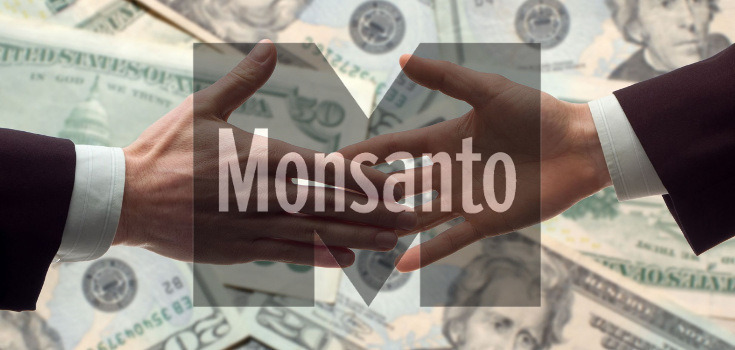 By Lisa Brown Guest Blogger
By Lisa Brown Guest Blogger
The Securities and Exchange Commission slapped Monsanto with an $80 million civil penalty for violating accounting rules and misstating past earnings related to rebates on its flagship weedkiller Roundup. Two accounting executives and a retired sales executive also agreed to pay penalties to settle the charges.
And while the SEC found no personal misconduct by Monsanto CEO Hugh Grant, the biotech seed giant disclosed Tuesday that Grant already had reimbursed the company $3.2 million in pay due to the restatement of corporate earnings in fiscal years 2009 through 2011.
The penalty is another black eye for the Creve Coeur-based company, which has had a number of high-profile setbacks in the past year.
During fiscal years 2009 to 2011, Monsanto booked “substantial” amounts of revenue from Roundup sales that had been spurred by the rebate programs, but the company failed to recognize all of the related costs in the proper year, the SEC said Tuesday.
By pushing costs into another year, the company boosted its profitability — on paper.
Corporations must be truthful in their earnings releases to investors to prevent misleading statements, SEC Chair Mary Jo White said in a statement.
“This type of conduct, which fails to recognize expenses associated with rebates for a flagship product in the period in which they occurred, is the latest page from a well-worn playbook of accounting misstatements,” White said.
As part of the settlement, Monsanto also agreed to retain an independent compliance consultant. Though settling the charges, Monsanto did not admit or deny the SEC allegations that it broke the law, according to the regulator’s press release.
Monsanto began the accounting shenanigans in 2009, when Roundup was facing intense competition. In that year, a flood of inexpensive, generic, Chinese-made glyphosate, the key ingredient in Roundup, hit the market.
Facing the prospect of a sharp decline in Roundup profits, Monsanto unleashed the rebate program to bolster sales.
Anthony Hartke developed and Sara Brunnquell approved talking points for the sales force to use when encouraging retailers to take advantage of the rebate program in the fourth quarter of fiscal 2009, the SEC said.
Both were accounting executives at the time, and the SEC said the two knew or should have known that the costs must be recorded that same year. But Monsanto delayed recognizing the costs until the following year, according to the regulator.
The company also offered rebates to distributors that hit agreed-upon volume targets that year, but then didn’t record those costs until 2010. Under one scheme, Monsanto sales executive Jonathan Nienas arranged payment of $44.5 million in rebates to two of its largest distributors.
Monsanto repeated the rebate program in 2010, and again improperly deferred the costs until 2011, the SEC said.
The SEC first began investigating the company for the accounting irregularities in 2011. Later that year, company restarted its earnings for the fiscal years 2009 and 2010, and the first three quarters of 2011.
“We have taken this matter very seriously and quickly moved in November 2011 to restate our financial statements … following an independent review of our accruals for customer incentive programs,” Monsanto said Tuesday in an emailed statement. “Today’s announced settlement does not require any changes to the company’s historical financial statements due to our proactive efforts.”
The company added that it fully cooperated with the SEC in its investigation.
The securities regulator also announced Tuesday that Hartke and Brunnquell were suspended from appearing and practicing before the SEC as accountants. Hartke also was fined $30,000, while Brunnquell was fined $55,000. Nienas was fined $50,000.
Hartke and Brunnquell “have been reassigned to different roles within the company,” while Nienas retired years ago, Monsanto told the Post-Dispatch.
The restatement led Grant and former CFO Carl Casale to reimburse the company for cash bonuses and certain stock awards they received during the restated periods.
Grant paid back $3.2 million and Casale returned $728,843. The company declined to say when the money was paid back.
During that three-year period, Grant earned $33.4 million in executive compensation, according to regulatory filings.
If the two executives hadn’t paid back the money, the SEC said it could have sued to invoke a “clawback” provision under Sarbanes-Oxley that requires executives to pay back compensation during periods when accounting misstatements occurred, even if the executives didn’t engage in misconduct.
Edward Jones equity analyst Matt Arnold said civil penalties by the SEC for accounting violations aren’t uncommon.
“It happens surprisingly often,” Arnold said. “It reflects the flexibility that exists with accounting rules — it’s as much a science as art, and it’s subject to interpretation when it comes to reporting these items.”
Wall Street appeared indifferent to the news. Monday’s stock edged up following the SEC’s announcement, closing Tuesday at $91.70 a share, up 0.5 percent from Monday’s closing price of $91.25.
“There will be no financial implications for shareholders to worry about,” Arnold said.
The company already had recorded the $80 million cost in its 2015 fiscal year.
Still, the penalty comes when Monsanto already hit a rough patch in the past 12 months.
In March, the cancer research arm of the World Health Organization declared glyphosate, Roundup’s key ingredient, as a probable carcinogen, a finding that the company is fighting. Five months later, Monsanto gave up on its efforts to take over Swiss rival Syngenta.
And as agricultural prices continue to tumble, the company announced the start of an aggressive cost-cutting program that will eventually slash 16 percent of its workforce over the next two years.
Copyright

